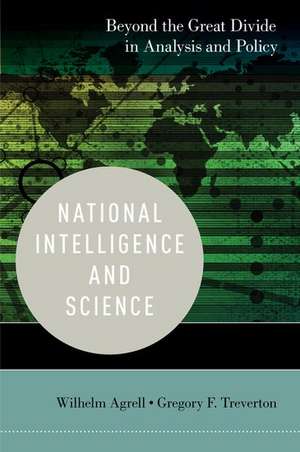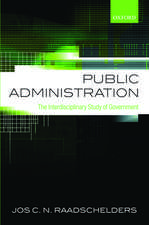National Intelligence and Science: Beyond the Great Divide in Analysis and Policy
Autor Wilhelm Agrell, Gregory F. Trevertonen Limba Engleză Hardback – 15 ian 2015
Preț: 320.25 lei
Preț vechi: 365.91 lei
-12% Nou
Puncte Express: 480
Preț estimativ în valută:
61.28€ • 64.15$ • 50.70£
61.28€ • 64.15$ • 50.70£
Carte tipărită la comandă
Livrare economică 27 martie-02 aprilie
Preluare comenzi: 021 569.72.76
Specificații
ISBN-13: 9780199360864
ISBN-10: 0199360863
Pagini: 234
Dimensiuni: 155 x 236 x 25 mm
Greutate: 0.44 kg
Editura: Oxford University Press
Colecția OUP USA
Locul publicării:New York, United States
ISBN-10: 0199360863
Pagini: 234
Dimensiuni: 155 x 236 x 25 mm
Greutate: 0.44 kg
Editura: Oxford University Press
Colecția OUP USA
Locul publicării:New York, United States
Notă biografică
Wilhelm Agrell is Professor of Intelligence Analysis at Lund University, Sweden and Visiting Professor at the Swedish National Defence College, Stockholm. He has a background in Swedish intelligence and military service in the Middle East. As an academic scholar, he received a Ph.D. in history at Lund University in 1985 and has written over 25 books, primarily dealing with Cold War history and Swedish security. He has been active in establishing intelligence analysis as an academic field and became the first Scandinavian professor in the subject in 2006. In addition to his academic work, he has also written several novels, some of which were translated into Finnish and German.Gregory Treverton is Director of the RAND Corporation's Center for Global Risk and Security and a Visiting Scholar at the Swedish National Defence College, Stockholm. In government, he has served the first Senate Select Committee on Intelligence, the National Security Council, and as Vice Chair of the National Intelligence Council. He has taught at Harvard University and Columbia University as well as the RAND Graduate School. He is the author or editor of three dozen books and major monographs, principally on intelligence, strategy, nuclear issues, Europe, and Latin America.










